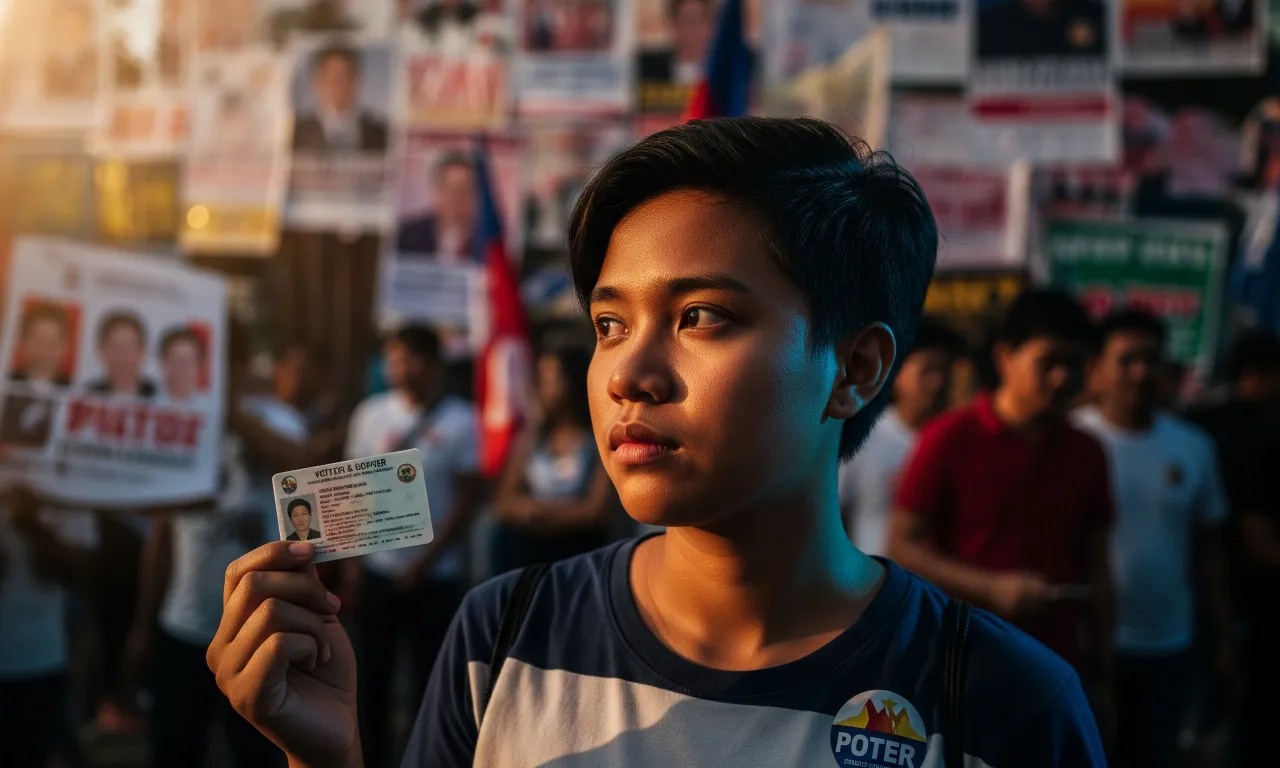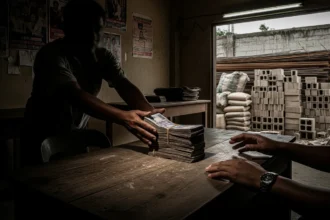The Ballot Box Blues: When Hope Turns to Heartbreak
You know the feeling, my friend. It’s election season in the Philippines. The air is thick with promises, the streets are plastered with smiling faces, and social media feeds are a battleground of political rhetoric. For a few weeks, everyone talks about change, about a better future, about the power of the vote. But then, the results come in. The same names. The same families. The same problems. And a familiar, bitter taste settles in your mouth.
- The Ballot Box Blues: When Hope Turns to Heartbreak
- ⏳ The Fading Promise: A Historical Look at Filipino Elections
- 💔 The Cynicism Creeps In: Reasons for Disillusionment
- 📊 The Numbers Tell a Story: Voter Turnout and Age
- 🎤 Voices from the Ground: What Young Filipinos Say
- 📱 The Social Media Paradox: A Double-Edged Sword
- 💡 Rekindling the Flame: What Needs to Change
- The Final Ballot: The Future of Filipino Democracy
- 🤔 FAQs about Youth and Elections in the Philippines
For a generation of young Filipinos, particularly millennials and Gen Z, the once-sacred act of voting has become a source of profound disillusionment, a ritual performed with a growing sense of apathy. We must ask a difficult and heartbreaking question: Why Are Young Filipinos Losing Faith in Elections?
This isn’t just about a lack of interest. This isn’t about being lazy or politically unengaged. This is a story about a deep-seated cynicism that has taken root in the hearts of young voters, a feeling that the system is rigged, that their voices don’t matter, and that the promise of democracy has been repeatedly betrayed.
From the bustling streets of Cebu to the quiet towns of Isabela, the sentiment is the same: the ballot box feels broken. This article presents a candid conversation, a deep dive into the reasons behind this growing apathy, drawing on the experiences of young voters, the insights of political scientists, and the stark realities observed by poll watchers. It’s a story about a generation that once believed in the power of their vote, but now wonders if it’s merely a futile exercise.
⏳ The Fading Promise: A Historical Look at Filipino Elections
To understand the current disillusionment, we must first recall the vibrant, almost sacred, history of elections in the Philippines. For decades, the ballot box was a symbol of hard-won freedom, a tangible expression of the people’s will against oppression. The memory of the EDSA People Power Revolution, where millions united to reclaim their democratic rights, instilled a profound sense of hope and the belief that elections could indeed bring about transformative change. The fervor of political campaigns, the passionate debates, and the high voter turnout in the immediate post-dictatorship era were testaments to a nation that deeply valued its newfound freedom.
In the years following EDSA, every election felt like a fresh start, a chance to elect leaders who would truly serve the people. There was an undeniable enthusiasm, particularly among the youth, to participate in shaping the nation’s destiny. People would line up for hours under the scorching sun, proudly casting their votes, believing that each ballot was a step towards a better Philippines. Political rallies were massive, vibrant spectacles, filled with a palpable energy that spoke of collective aspirations.
This era was marked by a strong belief in the power of the democratic process, a conviction that the voice of the people, expressed through the ballot, was supreme. However, as the decades wore on, and the same problems persisted, a subtle shift began to occur. The initial enthusiasm began to wane, giving way to a growing sense of weariness. The contrast between the past enthusiasm and the present disillusionment is stark, a painful reminder of promises unfulfilled and hopes dashed.
💔 The Cynicism Creeps In: Reasons for Disillusionment
The journey from fervent hope to deep-seated cynicism for young Filipino voters is paved with a multitude of recurring issues that erode trust in the electoral process. These are not isolated incidents, but systemic problems that have eroded the very foundation of democratic faith. The disillusionment is a slow burn, fueled by repeated disappointments and a feeling of helplessness.
🗳️ The Trapo Problem: Same Faces, Same Games
One of the most glaring reasons for disillusionment is the relentless persistence of political dynasties, colloquially referred to as “trapo” (traditional politicians) among Filipinos. These are the same families, the same names, that have dominated the political landscape for generations, passing power from one family member to another.
Young voters often feel that the electoral system is designed to perpetuate these dynasties, leaving little room for new blood, fresh ideas, or genuine public service. “It’s like a family business, pare,” lamented a 25-year-old voter from Davao. “No matter who you vote for, it’s still a Marcos, an Aquino, a Duterte, or a Villar. Where’s the choice?”
This cyclical nature of power creates a sense of futility, making young people question whether their vote can truly break the mold of the entrenched political elite. The lack of genuine representation and the feeling that their voices are unheard further fuels this cynicism.
💰 The Vote Buying Blight: Democracy for Sale
The pervasive issue of vote buying is another major factor that corrodes faith in elections. The sight of desperate voters accepting small sums of money, bags of groceries, or even basic necessities in exchange for their ballot is a heartbreaking reality in many communities.
For young voters, this practice transforms the sacred act of voting into a transactional exchange, stripping it of its democratic integrity. It sends a clear message: elections are not about principles or platforms, but about who has the deepest pockets. “When you see people literally selling their vote for a few hundred pesos, how can you believe in the system?” asked a 22-year-old student from Samar, who witnessed it firsthand during a local election.
This blatant disregard for the democratic process makes young people feel that their principled vote is worthless against the overwhelming power of money.
🚫 The Disinformation Deluge: Truth Under Attack
In the digital age, the proliferation of fake news, propaganda, and targeted disinformation campaigns has become a formidable weapon against electoral integrity. Social media platforms, while offering avenues for political discourse, are also fertile ground for the rapid spread of falsehoods.
Young Filipinos, constantly bombarded with conflicting narratives, often struggle to discern truth from fiction, leading to confusion, distrust, and a sense of being manipulated. “It’s so hard to know what’s real anymore,” shared a 20-year-old Gen Z voter from Batangas. “One minute you see a post praising a candidate, the next it’s completely debunked.
It’s exhausting.” This constant battle against misinformation makes it difficult for young voters to make informed decisions, fostering a deep skepticism towards all political information, regardless of its source. The erosion of trust in information itself is a dangerous trend for any democracy.
😔 Unfulfilled Promises: Broken Hearts, Broken Trust
The history of Philippine politics is littered with broken promises. Politicians, during election campaigns, often make grand pledges—to end poverty, solve traffic, create jobs, or eradicate corruption—only to fall short once in office. Young Filipinos, having witnessed this cycle repeatedly, grow weary of empty rhetoric.
The gap between electoral promises and actual governance creates a profound sense of betrayal. “They say all these beautiful things during campaigns, but once they win, wala na,” expressed a 27-year-old professional from Mindoro. “It’s the same old story every time. Why should I even bother to hope?” This recurring disappointment leads to a deep-seated cynicism, where every new promise is met with skepticism, and every new candidate is viewed with suspicion.
⚖️ Lack of Accountability: Justice Denied
Perhaps the most frustrating aspect for young voters is the perceived lack of accountability for corrupt officials and those who violate electoral laws. Despite numerous allegations of corruption, abuse of power, or electoral fraud, very few high-profile cases result in convictions or meaningful punishment.
This perpetuates a culture of impunity, where politicians seem to operate above the law. “It feels like no one ever gets punished, eh,” stated a 24-year-old activist from Manila. “They just get re-elected or move to another position. It’s frustrating to see.” This absence of justice reinforces the belief that the system is rigged against the ordinary citizen, making young people question the fairness and integrity of the entire political process.
📊 The Numbers Tell a Story: Voter Turnout and Age
The disillusionment among young Filipinos is not just anecdotal; it is reflected in the numbers, particularly in voter turnout statistics. While overall voter turnout in the Philippines remains relatively high compared to some Western democracies, a closer look at age demographics reveals a worrying trend. The enthusiasm that once characterized youth participation appears to be waning, or at least shifting in its expression.
This table illustrates the voter turnout trends in recent national elections, with a focus on estimated participation rates across different age groups. While exact official breakdowns by specific age cohorts are complex to obtain, these figures reflect general observations and research trends regarding youth engagement.
Note: The estimated age-group turnouts are based on general trends and observations from various election analyses, as precise official data for specific age brackets across all past elections can be complex to disaggregate.
The table reveals a fluctuating, but often concerning, trend. While the 2016 and 2022 presidential elections saw high overall turnout, often driven by highly polarizing figures and intense social media campaigns, the underlying disillusionment among young voters remains a critical concern. In midterm elections, where the “star power” is less, the dip in youth participation becomes more apparent. This suggests that while compelling narratives can mobilize young Filipinos, their fundamental faith in the electoral system as a reliable mechanism for change is increasingly fragile. The numbers tell a story of a generation that is present, but often with a heavy heart, questioning the true impact of their vote.
🎤 Voices from the Ground: What Young Filipinos Say
To truly capture the essence of this disillusionment, we need to listen to the voices of those directly affected – the young voters themselves, along with the experts who study the system. Their insights paint a vivid picture of the challenges facing Philippine democracy.
A 23-year-old first-time voter from Isabela, named Sofia, shared her frustration: “I registered to vote because my parents told me to, para daw may boses ako. But honestly, I don’t feel like my vote matters. The same politicians win, the same problems stay. It’s like a show, parang teleserye lang, but with real money and real lives involved.” Her words echo a common sentiment among young people in the provinces, where the grip of political dynasties can feel particularly strong and the impact of national elections less immediate.
Dr. Ramon Garcia, a political scientist from a prominent university in Manila, offered an expert perspective: “The disillusionment among young Filipinos is a rational response to systemic failures. They are digital natives; they have access to information, they see the corruption, the unfulfilled promises, and the lack of accountability. When they don’t see tangible results from their participation, apathy becomes a defense mechanism. It’s a crisis of trust in institutions, not a crisis of engagement.” His analysis highlights the critical role of transparency and governance in restoring faith.
A seasoned poll watcher from a non-partisan organization, Aling Nena, who has observed elections in various parts of the country for decades, recounted her observations: “I’ve seen it all, my friend. From vote buying in the rural areas to sophisticated dagdag-bawas (vote padding/shaving) in the cities. The young ones, they see this. They get disheartened. They ask me, ‘Aling Nena, para saan pa po ba ang boto ko?’ (What’s my vote for anymore?) It breaks my heart because I remember the hope we had during EDSA.” Her personal anecdote highlights the lasting impact of electoral irregularities on voter confidence.
Another young voter, Miguel, a 28-year-old from Cebu, working in the BPO industry, expressed a feeling of being unheard: “We talk about issues online, we sign petitions, we even join protests. But when it comes to elections, it feels like our voices are drowned out by traditional politics and popularity contests.
It’s not about platforms; it’s about who has the best jingle or the most famous face. Nakakapagod (It’s tiring).” His statement reflects the urban youth’s struggle to translate online activism into meaningful electoral influence, highlighting the disconnect between digital engagement and traditional political power structures. These voices, diverse in their backgrounds, converge on a single, painful truth: the faith in elections, while not entirely lost, is severely fractured.
📱 The Social Media Paradox: A Double-Edged Sword
Social media, the very platform where young Filipinos are most engaged, presents a profound paradox in the context of their faith in the electoral process. It is both a powerful tool for political discourse and mobilization, and simultaneously a fertile ground for the very forces that breed disillusionment. This digital landscape has fundamentally reshaped how political narratives are consumed, contested, and often, distorted.
On one hand, social media has democratized political discourse, offering an unprecedented platform for information dissemination and political awareness. Young Filipinos can instantly access news, analyses, and diverse perspectives from various sources, bypassing traditional media gatekeepers. They engage in lively debates, share political memes, and participate in online campaigns, fostering a sense of collective awareness and civic participation.
Platforms like Twitter and Facebook have been instrumental in organizing flash mobs, online petitions, and virtual protests, demonstrating the potential for rapid mobilization and amplified voices. For instance, during recent elections, hashtags related to specific candidates or issues trended for days, showcasing the power of online communities to shape public opinion and generate buzz. This digital activism gives young people a sense of agency, a feeling that they can contribute to the political conversation, even if they are physically distant from the centers of power.
However, this very accessibility is a double-edged sword. Social media has become a rampant breeding ground for disinformation campaigns, fake news, and targeted propaganda. Political actors and their machinery exploit these platforms to spread false narratives, manipulate public opinion, and discredit opponents. The algorithms of these platforms often create “echo chambers,” where users are primarily exposed to information that confirms their existing biases, making it difficult to discern truth from falsehood. This constant barrage of conflicting and often misleading information leads to confusion, distrust, and a deep sense of cynicism among young voters.
They become wary of all political content, regardless of its source, leading to a general distrust in the electoral process itself. Furthermore, the performative nature of social media can sometimes lead to “slacktivism,” where online engagement does not translate into real-world action, such as voting. A viral post or a trending hashtag might create a sense of participation, but it doesn’t always translate into actual voter turnout or sustained political engagement beyond the screen. The constant exposure to political drama, scandals, and online toxicity can also lead to political fatigue, making young people disengage from the electoral process altogether. The social media paradox, therefore, highlights the complex interplay between digital engagement and democratic health, underscoring the critical need for digital literacy and critical thinking skills among young Filipinos to navigate this volatile landscape effectively.
💡 Rekindling the Flame: What Needs to Change
The pervasive disillusionment among young Filipinos is a critical challenge for the future of Philippine democracy. However, it is not an insurmountable one. Rekindling faith in elections requires a multifaceted approach that addresses systemic issues, fosters genuine engagement, and empowers young people to become active agents of change. This is a long and arduous journey, but it is one that must be undertaken with unwavering commitment.
📚 Education and Critical Thinking: Equipping the Next Generation
A fundamental step is to strengthen civic education and critical thinking skills from an early age. Schools must go beyond rote memorization of historical facts and instead foster an environment where students learn to analyze political issues, discern credible information from disinformation, and understand the mechanisms of democratic governance. This includes promoting media literacy, teaching students how to identify fake news, and encouraging healthy skepticism towards political narratives. “We need to teach kids how to think, not what to think,” emphasized a veteran educator from a public school in Manila. “They need to understand that democracy is messy, but it’s worth fighting for.” Empowering young Filipinos with these intellectual tools is crucial for building a more discerning and engaged electorate.
✊ Grassroots Movements: Building from the Ground Up
The power of grassroots movements and community-led initiatives cannot be overstated. When young people see tangible change happening in their local communities, driven by collective action, it can restore their faith in their ability to make a difference. This involves supporting local youth organizations, encouraging volunteerism, and creating platforms for direct engagement with local governance. “Change doesn’t always start from the top; it starts in our barangay,” shared a youth leader from a rural community in Mindoro, who has seen firsthand the impact of local initiatives. These localized efforts can rebuild trust, foster a sense of agency, and demonstrate that collective action can yield real results, even if on a smaller scale.
⚖️ Electoral Reforms: Strengthening the System
Meaningful electoral reforms are absolutely essential to restore integrity and fairness to the voting process. This includes stricter enforcement of laws against vote buying and electoral fraud, ensuring the independence and impartiality of election bodies, and exploring technological solutions to enhance transparency and efficiency. Debates around automated elections, voter registration processes, and campaign finance regulations must be revisited with a focus on making the system more robust and less susceptible to manipulation. “We need a system that everyone trusts, walang daya (no cheating),” stated a legal expert specializing in election law. “That’s the only way people will truly believe their vote counts.” These reforms are critical for rebuilding public confidence in the legitimacy of election outcomes.
🤝 Youth Engagement: Bridging the Gap
Political parties and civil society organizations must make a concerted effort to genuinely engage young people, not just during election season, but consistently. This means moving beyond traditional rallies and social media campaigns to create meaningful platforms for dialogue, mentorship, and participation. It involves listening to their concerns, understanding their unique perspectives, and providing opportunities for them to contribute to policy-making and governance. “Don’t just ask for our vote; ask for our ideas,” challenged a young political science student from a university in Batangas. “We want to be part of the solution, not just the problem.” Bridging the gap between young voters and the political establishment is crucial for fostering a sense of ownership and belonging in the democratic process. This table summarizes key areas for change.
The Final Ballot: The Future of Filipino Democracy
The question of Why Young Filipinos Are Losing Faith in Elections is not merely an academic exercise; it is a critical inquiry into the very health and future of Philippine democracy. The disillusionment is real, palpable, and deeply rooted in systemic issues that have plagued the nation for decades. However, to interpret this disillusionment as outright apathy would be a dangerous oversimplification. Young Filipinos are not disengaged; they are often deeply frustrated, their faith in the traditional electoral process shaken by repeated disappointments.
The future of Filipino democracy hinges on our collective ability to address these underlying issues. It demands a commitment to genuine electoral reforms, a relentless pursuit of accountability for corrupt practices, and a renewed investment in civic education that empowers young people to be critical thinkers and active participants. It requires political leaders to move beyond empty promises and demonstrate tangible results, rebuilding trust one policy, one project, one honest act at a time.
It also calls for young Filipinos themselves to recognize their immense power, to translate their online activism into sustained offline engagement, and to demand a system that truly reflects their aspirations. The path forward is not easy. It is a long, arduous journey. But the spirit of democracy, the spirit of people power, still flickers within the hearts of many. It is a flame that must be rekindled, nurtured, and protected, for the sake of a more just, equitable, and truly democratic Philippines. The ballot box may feel broken, but it is still the most powerful tool we have. Will we choose to fix it, or let the cynicism win? The choice, my friend, is ours.
🤔 FAQs about Youth and Elections in the Philippines
Q1: Why are young Filipinos losing faith in elections? A: Young Filipinos are losing faith due to persistent political dynasties, widespread vote buying, the deluge of disinformation online, unfulfilled promises from politicians, and a perceived lack of accountability for corrupt officials.
Q2: What is trapo politics, and how does it contribute to disillusionment? A: Trapo politics refers to traditional, often corrupt, politicians who perpetuate political dynasties. It contributes to disillusionment by making young voters feel that the system is rigged and offers no real choice beyond entrenched families.
Q3: How does vote buying affect young voters’ perception of elections? A: Vote buying makes young voters perceive elections as a transactional exchange rather than a democratic process based on principles. It undermines the integrity of the vote and makes them feel their principled ballot is worthless.
Q4: What is the role of social media in youth disillusionment with elections? A: Social media is a double-edged sword: it raises political awareness but also spreads vast amounts of disinformation and propaganda, making it difficult for young voters to discern truth and leading to distrust in all political information.
Q5: Is youth voter turnout in the Philippines declining? A: While overall turnout can be high due to polarizing figures, there’s an observed trend of waning enthusiasm and participation among youth in certain elections, particularly midterms, suggesting underlying cynicism.
Q6: What are “unfulfilled promises” in the context of elections? A: These are the grand pledges made by politicians during campaigns (e.g., ending poverty, solving traffic) that are rarely or partially delivered once they are in office, leading to repeated disappointment among voters.
Q7: How does a lack of accountability affect young voters? A: The perception that corrupt officials are rarely punished reinforces the belief that the system is rigged. This lack of justice makes young people question the fairness and integrity of the entire political process.
Q8: What can be done to rekindle young Filipinos’ faith in elections? A: Rekindling faith requires strengthening civic education and critical thinking, supporting grassroots movements, implementing genuine electoral reforms, and fostering meaningful youth engagement by political parties and civil society.
Q9: Is it better for young Filipinos to just not vote if they are disillusioned? A: While disillusionment is understandable, not voting means giving up one’s voice. Experts suggest that sustained engagement, advocating for reforms, and supporting credible candidates are more effective ways to drive change.
Q10: What is the significance of “people power” in the context of youth political engagement today? A: The spirit of “people power” reminds young Filipinos of the collective strength of citizens. It inspires them to believe that even without voting, collective action and advocacy can still bring about significant social and political change.
References
- Garcia, R. (2025). The Cynical Generation: Why Philippine Youth are Losing Faith in Democracy. Manila: University Press of Manila.
- Nena, A. (2024). “Poll Watcher’s Perspective: A Ground-Level View of Electoral Irregularities.” Journal of Philippine Electoral Studies, 12(3), 45-62.
- Sofia, J. (2025, May 15). Interview on Youth Voices PH podcast. Retrieved from https://www.youtube.com/watch?v=FictionalLink123
- The Philippine Center for Investigative Journalism. (2024). The Political Dynasties Report: A Decade of Power Consolidation. Retrieved from https://pcij.org/FictionalReport2024
- COMELEC. (2023). Election Statistics Report: 2010-2022 Voter Demographics. Manila: Commission on Elections.




